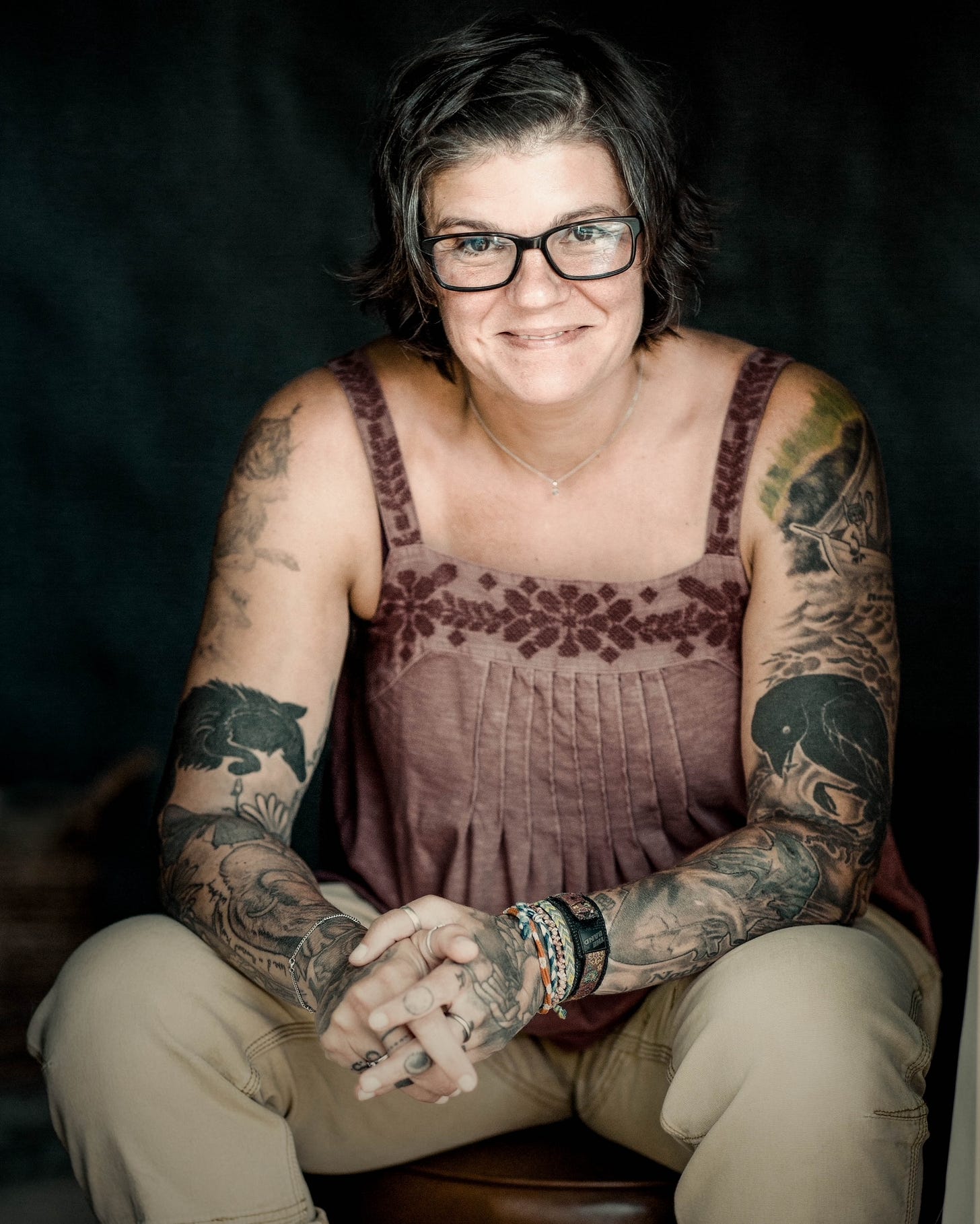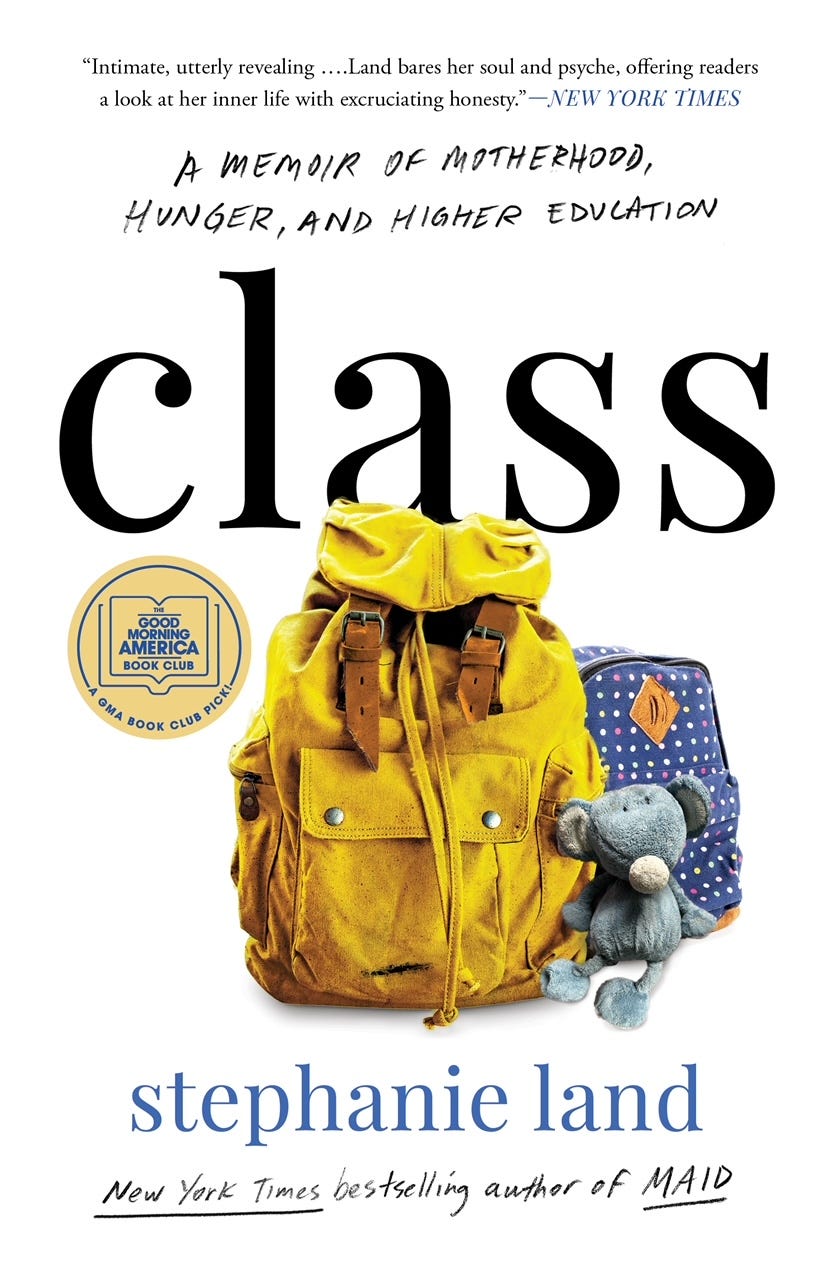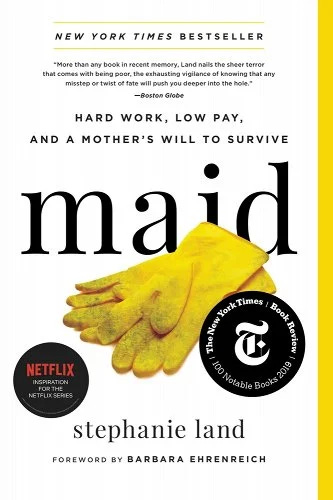The Memoir Land Author Questionnaire #1: Stephanie Land
"Like any person who wants a career in writing, I first had to figure out what that meant. How did people actually get paid? How did they get book deals?"
Since 2010, in various publications, I’ve interviewed authors—mostly memoirists—about aspects of writing and publishing. Initially I did this for my own edification, as someone who was struggling to find the courage and support to write and publish my memoir. I’m still curious about other authors’ experiences, and I know many of you are, too. So, inspired by the popularity of The Oldster Magazine Questionnaire, I’ve launched The Memoir Land Author Questionnaire.
Here’s the first installment, featuring two-time bestselling memoirist Stephanie Land - Sari Botton
Stephanie Land is a New York Times bestselling author and public speaker. Her first book, MAID: Hard Work, Low Pay, and a Mother’s Will to Survive, has been published in 30 languages and inspired the series MAID, which was viewed by 67 million households in its first month and is one of the most-watched Netflix limited series of all time. Her second memoir, CLASS: A Memoir of Motherhood, Hunger, and Higher Education was a Good Morning America Book Club pick and is both the sequel and origin story of MAID. Stephanie speaks at colleges and non-profit organizations all over the country and advocates for domestic violence survivors and people who parent under the poverty line. Follow her everywhere @stepville or through her Substack at stephanieland.substack.com.
--
How old are you, and for how long have you been writing?
45; 35 years.
What’s the title of your latest book, and when was it published?
CLASS: A Memoir of Motherhood, Hunger, and Higher Education. November 3, 2023.
What number book is this for you?
The big ol’ sophomore book at number two.
How do you categorize your book—as a memoir, memoir-in-essays, essay collection, creative nonfiction, graphic memoir, autofiction—and why?
It’s a straight memoir, but also the sequel and origin story of my first book, MAID, which was honestly pretty fun to write.
The fight to feed, house, and clothe my daughter is a constant battle I face throughout the book while I fight for something many people feel entitled to: a degree in higher education.
What is the “elevator pitch” for your book?
CLASS picks up where my first book, MAID, left off. It begins with the start of my senior year of college and my daughter’s first year of public school in kindergarten, and shows the parallels in the barriers we faced to get to class because of the social class we were in. I call that year my hungriest, both physically and in my career as a writer. The fight to feed, house, and clothe my daughter is a constant battle I face throughout the book while I fight for something many people feel entitled to: a degree in higher education.
What’s the back story of this book including your origin story as a writer? How did you become a writer, and how did this book come to be?
I’ve known I was a writer since I was 10 years old, and have written as a way to process the world around me and get things out of my head. It became as necessary as breathing. Like any person who wants a career in writing, I first had to figure out what that meant. How did people actually get paid? How did they get book deals? After college, and getting rejected from the only MFA program I could kind of afford to attend, I decided I needed to grow a following and bulk up my bylines. I had a couple of pieces published that paid in “exposure” before I placed an essay through Vox with an unimaginable paycheck of $500. The essay went wildly viral and I secured a book deal for a memoir based on it in 11 months.
CLASS was originally sold as an untitled, heavily reported, deep dive into the housing crisis. Not only did I struggle with feeling able to do this since I had no real journalistic experience, the pandemic hit, so traveling for those interviews was impossible. After six months or so, under a new agent, I spoke to my editor about changing the premise to higher education. But it was still supposed to be narrative nonfiction and not memoir. It wasn’t until the Netflix series based on my first book ran off in a wildfire of success that I was granted permission to “Write whatever the fuck I wanted,” so I chose what I’d originally wanted to do all along: a memoir about my senior year of college.
Writing felt impossible because I would second-guess myself all the time, knowing what would make people angry enough to leave a bad review on Amazon. Eventually, I had to give a name and image to this person who I knew would hate my book. I called her Barbara From Michigan, and I grew to enjoy pissing her off by, basically, saying poor people deserve nice things.
What were the hardest aspects of writing this book and getting it published?
Writing the book felt impossible for many reasons. I knew too much. I knew about things like Goodreads and book tour and invasive questions from strangers. As an introvert, book tour was traumatic, and I was blocked from writing my second book because every word got me closer to having to promote it. I also had to write about my kids, and especially the conception of my youngest daughter, which meant I would have to write in some sex scenes. Writing felt impossible because I would second-guess myself all the time, knowing what would make people angry enough to leave a bad review on Amazon. Eventually, I had to give a name and image to this person who I knew would hate my book. I called her Barbara From Michigan, and I grew to enjoy pissing her off by, basically, saying poor people deserve nice things.
How did you handle writing about real people in your life? Did you use real or changed names and identifying details? Did you run passages or the whole book by people who appear in the narrative? Did you make changes they requested?
It depends. My first book had almost all fictionalized names, but with my second I still talked to a lot of the people who were in the book so I was able to ask them if it was okay to use their real names. Several people in CLASS have fictionalized names and that’s purely because I don’t talk to them anymore for reasons that played out in the book. One difficult decision was if I should change the names of my professors, and I waited until the legal vetting both from my publisher and my personal lawyer to decide. They all agreed that it was fine to leave the names as-is since they are public figures, so I did. Part of this was that I had some professors that year who I am still close to, and they are hugely supportive of the book. I wanted to celebrate them and who they are and it was important to me that they felt I had represented them well. I don’t usually share my writing before it’s published but I made sure to give several people ARCs when I still had a bit of time to make some changes and made sure they liked it, which was nerve-wracking. But they all really appreciated not only how they were written, but the town and the writing program itself, and that meant a lot to me.
Who is another writer you took inspiration from in producing this book? Was it a specific book, or their whole body of work?
Melissa Febos’s book BODY WORK: The Radical Power of Personal Narrative ended up being a huge inspiration for me. I didn’t want to write about sex—specifically me having sex with other people—and her book reminded me that it can be done in empowering ways. Whether people agree with it or not, single moms can, do, and most importantly should have sex and be able to enjoy their bodies. In today’s political climate, that can be a dangerous thing. But I also experimented with being angry in this book, and was a bit more forthcoming with how I spent my money, and that included treats. I knew from experience that if any of that upset people, it would say a lot more about them than me or anything I did.
I don’t usually share my writing before it’s published but I made sure to give several people ARCs when I still had a bit of time to make some changes and made sure they liked it, which was nerve-wracking. But they all really appreciated not only how they were written, but the town and the writing program itself, and that meant a lot to me.
What advice would you give to aspiring writers looking to publish a book like yours, who are maybe afraid, or intimidated by the process?
I truly believe that we writers hold a lot of power in our ability to create change. If we’re only reading the experiences of white men or people who are otherwise privileged, that’s not an honest representation of the population. Personal narratives allow us to feel empathy and gain understanding, and that grows to compassion. I do believe that real change can happen that way, either in how we vote or how we treat a homeless person or someone who cleans our home. I don’t know how many people have reached out to me over the years to tell me they are less judgmental of others, or leave cash tips when they hadn’t before, or that the book saved their life by gaining courage to leave an abusive situation. Writing and sharing our stories can do all of that and more.
What do you love about writing?
I’ve really love writing in-scene—especially about my children. It’s a record of our lives together and that’s very precious to me. As a single mom, it was difficult to keep track of moments I didn’t want to forget. I didn’t have baby books, I had journals, blog entries, photos, and now I have whole books that, to me, are a love story of getting to be their mom.
What frustrates you about writing?
It’s rare that I get to write for fun and for the sake of writing. I think that’s why I’m appreciating the Substack platform so much. I have a lot of freedom and it doesn’t have to go through a process where another person decides if it’s marketable, a good fit, not “too niche”, and on and on for all the reasons they tell you to write something other than what you pitched.
Melissa Febos’s book BODY WORK: The Radical Power of Personal Narrative ended up being a huge inspiration for me. I didn’t want to write about sex—specifically me having sex with other people—and her book reminded me that it can be done in empowering ways. Whether people agree with it or not, single moms can, do, and most importantly should have sex and be able to enjoy their bodies.
What about writing surprises you?
How hard it is. You would think, after writing for 35 years, that it would be easier, you know? But no. Writing is fucking hard.
Does your writing practice involve any kind of routine, or writing at specific times?
No, it all comes out in a chaotic rush to get it on the page. I write a lot in my head, so I’ll spend days/weeks/months internally working on organizing a piece and determining its arc. Then I’ll get to a point where I “just” need the opening sentence and scene, so I kind of wait for it to come to me, which is super annoying because it often comes at a very inopportune time. I’ve been saying for years that I need some kind of writing apparatus available for the shower.
Do you engage in any other creative pursuits, professionally or for fun? Are there non-writing activities do you consider to be “writing” or supportive of your process?
My day job is a public speaker which involves a lot of storytelling, or more specifically, figuring out which story will connect the most with different audiences. Since my job involves a lot of traveling, I appreciate my time at home. I procrastinated writing my last book through acquiring houseplants, so I do spend a lot of time taking care of those. I love the aesthetic parts of my home and will rearrange what’s on shelves often. I also kind of fell into horse ownership when I was in the thick of writing my last book because my oldest had kept up with riding lessons for four years. Since horses are so intuitive (they can hear your heart beating from four feet away!) I have to go through some kind of meditation when I’m preparing to spend time with him. He calms me and demands my full attention and the barn is my work-free zone, which I have found to be absolutely necessary for my mental health.
I don’t know how many people have reached out to me over the years to tell me they are less judgmental of others, or leave cash tips when they hadn’t before, or that the book saved their life by gaining courage to leave an abusive situation. Writing and sharing our stories can do all of that and more.
What’s next for you? Do you have another book planned, or in the works?
Success was an isolating experience for me. I’ve been either writing or promoting a memoir full-time for the last six years, and it feels really good to get a small break from that to figure out what I want to do next. I signed up for all of these writing classes and got a Masterclass subscription and I’m reading (and subscribing to) a ton of newsletters, essays, and essay collections. I’m enjoying writing for fun through Substack and having the space and time to process and think about what I want to do with this platform I’ve acquired. My next project is still in the planning stages so I probably shouldn’t talk about it publicly quite yet, but I am very excited about its premise.






Hi Stephanie. I am so glad I read this. Every word. I feel elevated by your story and that's the only reason I read anything. All the way down to learning that horses can hear your heartbeat four feet away. I think that's what happens when we write to one another: we hear each other's heartbeats. Glad you found Substack and Sari Botton. We're not Netflix. Nobody's appropriating anything here. A safe zone, like your barn.
Freaking awesome, both of you! Great questions, Sari. And Stephanie ... you inspire in so many ways. Your answer about the power of writing to create change, especially the bit about empathy and compassion--YES! Aspiring memoirist, here, bows with thanks.